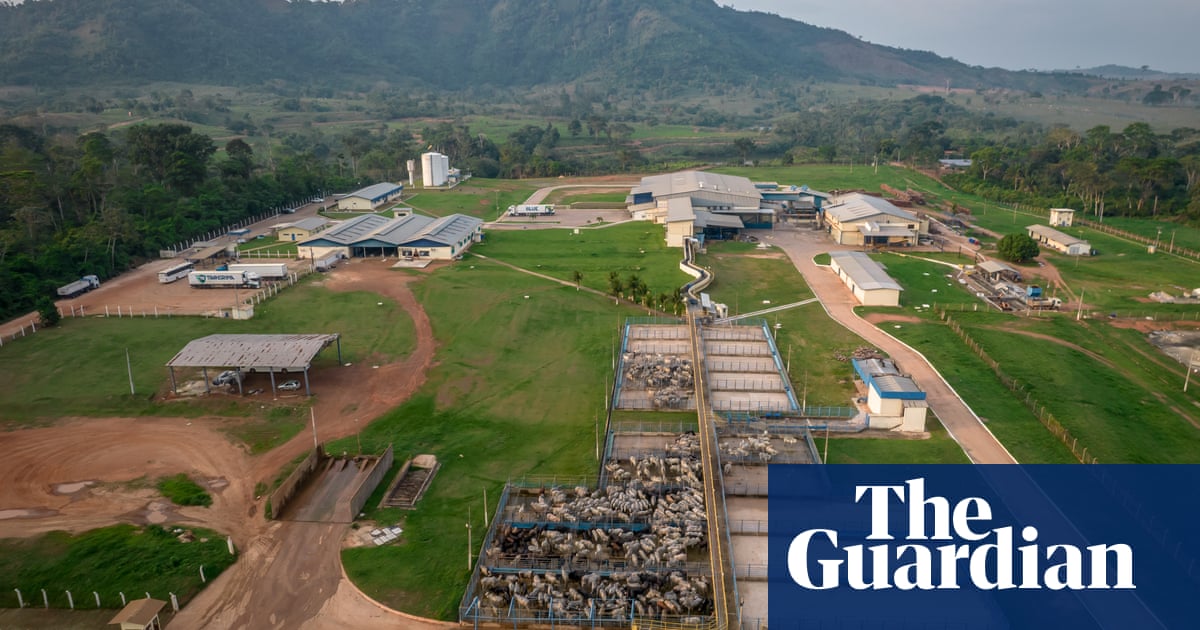Hundreds of lobbyists for industrial agriculture are attending the Cop29 climate summit in Baku, analysis shows.
They include representatives from some of the world’s largest agribusiness companies including the Brazilian meatpacker JBS, the animal pharmaceuticals company Elanco, and the food giant PepsiCo, as well as trade groups representing the food sector.
Overall, 204 agriculture delegates have accessed the talks this year, analysis by DeSmog and the Guardian reveals. While the total number has dropped compared with the record highs at Cop28, the figures show climate Cops remain a top priority for businesses working in agriculture, a sector that accounts for up to a third of global greenhouse gas emissions.
Food sector lobbyists remain highly influential, and have travelled to Baku as part of country delegations from Brazil, Russia and Australia, among others. This year, nearly 40% of delegates travelled to the summit with country badges, giving them privileged access to diplomatic negotiations, up from 30% at Cop28, and just 5% at Cop27.
Delegates from the meat and dairy sector sent 52 delegates to the summit this year, with 20 travelling with Brazil’s government, the analysis found. They outnumbered the delegation of the Caribbean island of Barbados, which in July was devastated by Hurricane Beryl, a disaster linked to climate breakdown.
Meat and dairy producers are coming under greater scrutiny due to increasing pollution from cattle and sheep, which emit about a third of the global output of methane. Farming also relies on synthetic fertilisers that are both fossil fuel-based and emit greenhouse gases, and drive deforestation.
But while studies point to the need for a drastic drop in meat and dairy production and a shift to climate-friendly farming, the agribusiness industry has lobbied hard against tougher environmental laws, in the EU, the US and at climate summits.
An Lambrechts, a senior campaign strategist from Greenpeace International, said there was a clear “conflict of interest” between big agriculture’s presence at the talks and the need for climate action.
“We see the same conflict of interest with the fossil fuel industry and how they act to drive the world away from the scope of actions and solutions that are needed to fight climate change and address its impacts,” she said.
Wanun Permpibul, from Climate Watch Thailand, said: “When Big Agriculture dominates the discussion, the voices of frontline communities – especially smallholder farmers, Indigenous peoples, women, and local food producers – are systematically excluded. Yet these are the people who have been living in harmony with nature for generations, using traditional knowledge to manage ecosystems, preserve biodiversity, and sustain local food systems.”
Those present on the ground from the agriculture industry include JBS, the world’s largest meat company, which sent three delegates to Baku. The world’s largest global food company, Nestlé, and the world’s second largest pesticides company, Bayer, have also sent delegates.
Brazil, the host of next year’s climate summit, was a major funnel for agricultural giants this year. That has sparked concerns over the sway agribusiness may hold over Cop30, which many see as an opportunity for ambitious food systems reform.
The Brazilian government brought in 35 agriculture lobbyists, including more than 20 representatives of the meat companies JBS, BRF and Marfrig, as well as powerful industry groups such as the Association of Brazilian Beef Exporters.
Russia brought the second largest number of big agriculture lobbyists, with 13 delegates from the fertiliser industry. Synthetic fertilisers are the leading driver of nitrous dioxide emission, a greenhouse gas that is 200 times more powerful than carbon dioxide and which is rising at unprecedented levels in the atmosphere.
Australia was next in line, with five representatives of the National Farmers Federation, which has publicly opposed measures to curb methane from animal agriculture.
Permpibul was concerned by the findings. “By bringing in a large contingent of lobbyists from Big Agriculture, Brazil is sending a message that protecting corporate interests takes precedence over addressing the climate crisis,” she said.
after newsletter promotion
“The presence of these lobbyists raises serious concerns about whether the upcoming Cop will prioritise real, community-led solutions or continue to push for market-based ‘fixes’ that do little to address the root causes of climate change.”
Many of the agribusiness delegates who attend climate summits will speak on panels and hold events to promote their positions. At these side events, industry leaders from meat, dairy, pesticides and fertiliser companies promote technical solutions to bring down the sector’s emissions, although authoritative studies have found efficiency measures will only ever be able to reduce a small portion of agricultural emissions, and must be accompanied by demand-side reductions, such as lower consumption of meat in rich countries.
Pesticides and fertilisers – much of which are used to support the growth of crops for industrial animal agriculture – are often derived from fossil fuels and have had major negative impacts on biodiversity, soil and water health.
Arnold Padilla, the deputy executive director of Pesticide Action Network Asia Pacific, said big agriculture was promoting “false solutions” designed to sustain and expand harmful farming practices. Instead, he said, the focus should be on “small farming communities that champion sustainable practices that avoid climate-harming chemicals and protect biodiversity”.
“These are the real solutions that are essential for cutting greenhouse gas emissions and tackling the climate crisis,” he said.
The analysis comes amid growing concerns over the outsized access corporate lobbyists have to climate summits, which has promoted calls for reform.
Earlier this month, DeSmog also recorded a large jump in lobbyists from big food companies attending the UN biodiversity talks, which ended without a strong deal for nature on 2 November.
Last Friday, Cop veterans and leading diplomats argued that the Cop process was no longer “fit for purpose”. Food systems experts have also called for reform.
Teresa Anderson, the global lead for climate justice at the development non-profit ActionAid, said she thought Cops were swayed in favour of corporate interests.
“Big agribusiness has all the money to spend on flying, wining and dining, unlike the smallholder agroecological farmers who are busy doing the actual work of feeding communities and protecting the climate,” Anderson said. “What ends up happening is that the real answers to the climate crisis aren’t being heard over the corporate cacophony.”



